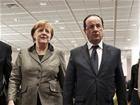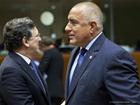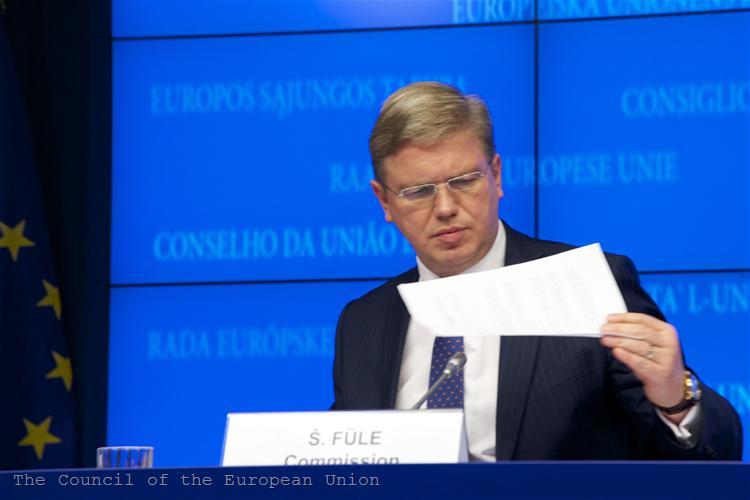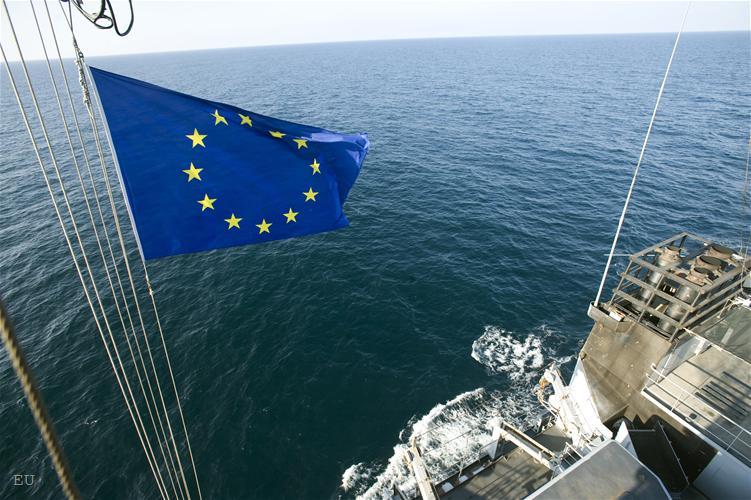The Big Plans for the Eurozone Are Left for Another Time
Adelina Marini, December 14, 2012
 If I have to answer the question in the title of euinside's article presenting the report of the four presidents, I would have to say that the European Economic and Monetary Union (EMU) will not be of the most genuine ones. The document, also known as Herman Van Rompuy's report, is titled "Toward a Genuine Economic and Monetary Union" and envisages three phases of upgrade of the eurozone, which this web site throughly described. The third phase, however, was the one that outlined what exactly genuine means - own budget and a system for absorption of economic shocks and to boost competitiveness. Well, these things are absent in the conclusions of the leaders of the 27 after their last for the year summit in Brussels which ended relatively early - around 2 in the morning CET.
If I have to answer the question in the title of euinside's article presenting the report of the four presidents, I would have to say that the European Economic and Monetary Union (EMU) will not be of the most genuine ones. The document, also known as Herman Van Rompuy's report, is titled "Toward a Genuine Economic and Monetary Union" and envisages three phases of upgrade of the eurozone, which this web site throughly described. The third phase, however, was the one that outlined what exactly genuine means - own budget and a system for absorption of economic shocks and to boost competitiveness. Well, these things are absent in the conclusions of the leaders of the 27 after their last for the year summit in Brussels which ended relatively early - around 2 in the morning CET.
In fact, if we take into account the expectations for a highly disappointing summit before it became clear that an agreement has been reached by the ministers of finance for the establishment of a single supervisory mechanism for banks (SSM), the summit can be defined as moderately successful. And depending on which side of the barrier you are, you could say that the summit was quite successful. For the federally inclined the meeting might be disappointing but for those who fought against the division of Europe into two speeds what has been agreed definitely is a success.
The member states against the Commission and the Parliament
From the leaders' conclusions it becomes clear that they very much insist on their fiscal compact, agreed precisely a year ago, and prefer to build their future on the compact and their own arrangements, instead on the basis of the Commission ideas supported to a large extent by the Europarliament. In their conclusions from last night, they have written that an immediate priority is the completion and implementation of the  economic governance framework, including the six-pack, the fiscal compact and the two-pack. They also call urgently to move toward an integrated financial framework which correlates to phase 2 in the four presidents' report.
economic governance framework, including the six-pack, the fiscal compact and the two-pack. They also call urgently to move toward an integrated financial framework which correlates to phase 2 in the four presidents' report.
An essential part of that framework is the supervisory mechanism, the single banks resolution mechanism and the mechanism for closer coordination of economic policies. As part of this framework is also the adoption of the directives for bank resolution and deposit guarantee schemes. Exactly as Van Rompuy's report envisages, the leaders recommend by March 2013 to be ready the legislation allowing the European Stability Mechanism (the eurozone permanent fund) to recapitalise banks directly. A pre-condition for that was the endorsement of the banking supervision.
By June 2013, European Council President Herman Van Rompuy, together with Jose Manuel Barroso and after consultations with the member states, has to present a time-bound roadmap for coordination of national reforms the way it is enshrined in the fiscal compact. In Article 11 of the compact it is written that all economic reforms that the member states plan to implement should be discussed in advance and where appropriate to be coordinated. Such coordination, the leaders write in their conclusions, will take place with the participation of the EU institutions. The Commission will develop an appropriate proposal in that vein and in the context of the European Semester.
 Obviously trying not to isolate the Europarliament completely, the leaders have written that the roadmap should include the social dimension of the EMU, including social dialogue. For example, yesterday (December 13) Martin Schulz wrote on Twitter that he was dismayed that Van Rompuy's paper said nothing of the social pact the Parliament called for. An interesting part of that roadmap will be the individual contractual arrangements between the member states and the European institutions the aim of which is to ensure competitiveness and growth, according to the leaders.
Obviously trying not to isolate the Europarliament completely, the leaders have written that the roadmap should include the social dimension of the EMU, including social dialogue. For example, yesterday (December 13) Martin Schulz wrote on Twitter that he was dismayed that Van Rompuy's paper said nothing of the social pact the Parliament called for. An interesting part of that roadmap will be the individual contractual arrangements between the member states and the European institutions the aim of which is to ensure competitiveness and growth, according to the leaders.
These contractual agreements are envisaged in Rompuy's draft and in Barroso's blueprint, but the difference between them is in the way of financing. The contracts will be obligatory for the eurozone members, while the others can enter into such arrangements if they wish. The fourth point in the roadmap should be the creation of a "solidarity mechanism" that "enhance" the efforts of member states in contractual arrangements for competitiveness and growth. This is in fact what has remained of the fiscal capacity, envisaged in Barroso's and the four presidents' plans.
The eurozone governance, the document says, should improve through upgrading the fiscal compact and on the basis of the agreement from the eurozone summit of June 29th, which practically means that all the other ideas are thrown in the dustbin. The statement from June 29th says that the leaders commit to ensure the eurozone financial stability through the existing instruments (the permanent and the temporary rescue fund of the eurozone) in a way that stabilises the markets for countries that stick to the country-specific recommendations and their commitments, including in terms of deadlines as set in the European semester. In other words, the countries that implement their Memorandums of Understanding will get rescue loans from the permanent eurozone fund.
In 2 o'clock last night, Herman Van Rompuy seemed satisfied. "This was a good  week for the EU", he said recalling the Nobel Peace Prize and the agreement for the banking supervision. Against the backdrop of the adopted conclusions, he has all the reasons to feel that way because they are based to a large extent on his report from December 5th. But Barroso did not seem that happy and this was evident quite clearly with the question about the drop out of the fiscal capacity from the leaders' future plans. According to Herman Van Rompuy, there are two types of fiscal capacity. The first is related to the financing of contractual arrangements and the incentives for countries bound to structural reforms. This is the so called solidarity mechanism that is expected to get clearer by June. The second is related to the absorption of asymmetric economic shocks.
week for the EU", he said recalling the Nobel Peace Prize and the agreement for the banking supervision. Against the backdrop of the adopted conclusions, he has all the reasons to feel that way because they are based to a large extent on his report from December 5th. But Barroso did not seem that happy and this was evident quite clearly with the question about the drop out of the fiscal capacity from the leaders' future plans. According to Herman Van Rompuy, there are two types of fiscal capacity. The first is related to the financing of contractual arrangements and the incentives for countries bound to structural reforms. This is the so called solidarity mechanism that is expected to get clearer by June. The second is related to the absorption of asymmetric economic shocks.
"We did not receive a task to work on it", answered Herman Van Rompuy, adding: "Of course, the Commission is always free to present any proposals in this regard but without an official task we cannot continue to explore these proposals". It seemed this hurt President Barroso who started the political season this autumn with a lot of ambition in his regular State of the Union address, breaking the taboo and mentioning freely the word "federation". And in the end of November his ideas took shape in his blueprint for the future of the eurozone. In the words of the former Portuguese prime minster, in fact no doors have been closed for the fiscal capacity. "Just the member  states concentrated more on what can be achieved now, namely the supervisory mechanism". According to him, no one closed the doors for other ideas - be it in the four presidents' report or the Commission blueprint, "and I think this is a fair assessment".
states concentrated more on what can be achieved now, namely the supervisory mechanism". According to him, no one closed the doors for other ideas - be it in the four presidents' report or the Commission blueprint, "and I think this is a fair assessment".
Not very excited seemed the European Parliament president too, Martin Schulz, who ended his participation in the Council quite early. His news conference was early in the evening on December 13th. He said that in his "guts" he felt that the leaders would not be sufficiently ambitious. He indirectly supported Barroso's blueprint saying it contained ideas that envisaged a lot of changes within the current treaties. "Herman Van Rompuy's plan does not go that far", Mr Schulz added. He, however, hoped that the upcoming European elections in 2014 are a good opportunity to discuss various ideas for the future structure of the EU. The Lisbon Treaty, he added, envisages the next Commission president to be nominated on the basis of the results from the European elections.
This means that the parties will propose nominations who will offer concepts for the future. Everyone who is on a high position in Europe or wants to be on such a position, should present views for the future. This will change the campaign, Martin Schulz added.
"What has entirely disappeared from the European Council is the notion of a  reflection on federal economic government to run things after fiscal integration has eventually been deepened. This is a huge mistake for the prime ministers to make because it will leave them and their national parliaments wholly unprepared to develop the constitution of the European Union in a democratic and efficient manner", said Andrew Duff, a liberal MEP and a eurofederalist (Britain).
reflection on federal economic government to run things after fiscal integration has eventually been deepened. This is a huge mistake for the prime ministers to make because it will leave them and their national parliaments wholly unprepared to develop the constitution of the European Union in a democratic and efficient manner", said Andrew Duff, a liberal MEP and a eurofederalist (Britain).
According to the leader of the liberals in the European Parliament, Guy Verhofstadt, the fact that the leaders have officially endorsed the supervisory mechanism does not at all mean that the vicious circle between the sovereign and the banks is interrupted, as the aim goes. This will not happen until a fully fledged banking union is created, Mr Verhofstadt believes. Also disappointed is Sven Giegold, from the group of Greens and European Free Alliance, according to whom the leaders have postponed the needed reforms. "Instead of using the pause in the financial markets, they postpone the solution of the crisis", he wrote on Twitter.
Two-pack
In fact, the confrontation between the more federalist-mooded Commission and Parliament and the Council was evident very strongly in the negotiations on the package of two legislative acts, also known as the two-pack. The package is precisely what the European Council has asked of Herman Van Rompuy to develop by the June summit - a roadmap for coordination of economic policies and special programmes between  troubled countries and the European institutions. The package was presented by the Commission in the end of last year in addition to the six-pack, but covering the eurozone countries.
troubled countries and the European institutions. The package was presented by the Commission in the end of last year in addition to the six-pack, but covering the eurozone countries.
The deeper integration is hiding exactly there. As euinside wrote, the two proposals are about surveillance of economic and budgetary policies of eurozone countries with serious difficulties to keep strict budgetary discipline (with rapporteur in the European Parliament Jean-Paul Gauzès, French MEP from EPP) and for surveillance and assessment of draft budget plans and correction of excessive deficit (on which rapporteur is Portuguese MEP from the group of Socialists Elisa Ferreira). The Parliament has adopted the reports in June, as a major element in Ferreira's report and which the Parliament very much insists on is the debt redemption fund.
The report of the Portuguese goes much farther proposing in fact a roadmap for enhanced coordination of economic policies, including creation of a common fund for sustainable growth in which to mobilise some 1% of GDP per year in the course of 10 years which is something similar to the shocks absorption function in the report of the four presidents. The aim of the tool is to create the necessary conditions for sustainable growth. The proposals also contain a mechanism for coordination of debt issuance in the eurozone countries with the participation of the Commission and the Council. The two-pack also contains "contractual arrangements". In the document of the Portuguese MEP, however, they are formulated differently - programmes for economic partnership.
In the process of trialogue - between the Commission, Parliament and Council - these ideas were replaced by the proposals contained in Barroso's blueprint, as it became clear during the debate on the two-pack in the Ecofin on December 4th. There, exactly as happened initially with the supervisory mechanism, there were huge expectations for an agreement, so that "we don't make the leaders call upon us to reach an agreement by the end of the year", as EU Monetary Affairs Commissioner Olli Rehn said.
In the beginning of the debate Vassos Shiarly, the finance minister of Cyprus, said that a compromised text had been achieved, in which several elements from Mrs Ferreira's proposal were deleted - the entire chapter 3a that contains a roadmap for economic coordination and debt issuance. And although both Olli Rehn and Vassos Shiarly believed a final result was close, German Finance Minister Wolfgang Schäuble announced that for Germany the proposed changes in the regulations were unacceptable. The problem, as it seems, is that to the proposals was attached Barroso's blueprint for reforms in the eurozone.
Austrian Minister of Finance Maria Fekter reacted sharply, saying on that very morning (December 4th) Barroso's blueprint was delivered from which it becomes  clear that many things were brought in line with the two-pack without discussion. According to her, it looked that the ministers were expected to approve the fiscal capacity while the EU budget was discussed. She demanded the text to be deleted because Austria would not accept anything outside the budget. With almost the same arguments spoke the Netherlands, France, Malta, Ireland and Belgium. According to the Netherlands, the proposals were premature because they concern possible results from the discussions in the European Council which had not taken place yet. Against the backdrop of that outcome, the summit conclusions of December 14th say: "Following the decisive progress achieved on the key elements of the "two-pack", the European Council calls for its rapid adoption by the co-legislators".
clear that many things were brought in line with the two-pack without discussion. According to her, it looked that the ministers were expected to approve the fiscal capacity while the EU budget was discussed. She demanded the text to be deleted because Austria would not accept anything outside the budget. With almost the same arguments spoke the Netherlands, France, Malta, Ireland and Belgium. According to the Netherlands, the proposals were premature because they concern possible results from the discussions in the European Council which had not taken place yet. Against the backdrop of that outcome, the summit conclusions of December 14th say: "Following the decisive progress achieved on the key elements of the "two-pack", the European Council calls for its rapid adoption by the co-legislators".
The next deadline is June 2013. Then it will become clear how far the leaders want to go and how genuine eurozone they will create.
 | © The Council of the European Union
| © The Council of the European Union | © European Parliament
| © European Parliament | © EU
| © EU